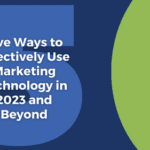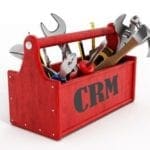The Top 10 Challenges to CRM Success and How to Avoid Them – Part 1

There are a number of issues and challenges that can occur when implementing a CRM that prevent CRM Success. In fact, research from leading industry experts has suggested that up to 70% of CRM implementations may fail to meet expectations. The good news is that CRM Success Is possible – if you can identify potential challenges early and are prepared with solutions.
Based on almost 12 years of consulting experience gained while working together with hundreds of Clients on successful CRM implementations, here are some of the biggest potential challenges we typically see – along with some best practices and solutions for success:
1. Strategy and Planning
Most firms approach CRM and related technology implementations on an ad hoc basis. But without a strategy and plan, the likelihood of a successful implementation is greatly reduced.
Solution: CRM Success starts with an understanding of your organization’s requirements and goals. This begins with a comprehensive needs assessment. Interviews should be conducted with key stakeholders to discuss current challenges, potential benefits a CRM could provide and how each group or individual define CRM success. Goals from the assessment should become the basis of your planning process. They should be reviewed, agreed upon by stakeholders and assigned to a timeline for completion. Detailed plans are often needed in several key areas including rollout, communication, data quality, training and integration.
2. Lack of Focus
The beauty of CRM is it can do a thousand things, but that doesn’t mean it should. You are more likely to stumble if you try to do too many things or solve too many problems at once, especially right out of the gate.
Solution: Don’t try to boil the ocean. Review your assessment goals and requirements and then take a step back and pick two or three to tackle first. Focus on small, measurable and achievable goals that can demonstrate the value of CRM and grow support for the system over time. Look for the low-hanging fruit that can provide the maximum benefits with minimal effort. Once those have been successfully addressed, move on to the next area. Needs frequently change over time, so you may need to make a few course corrections along the way, but you will also be likely to see that as you solve problems, new groups of users will come knocking at your door wanting to adopt the system for their needs – which is a great problem to have.
3. Buy-In / Adoption
If prospective users don’t see the value of CRM for the organization and, more importantly, the benefits it will provide to them, they will regard system use as a burden and are unlikely to participate. Lack of participation also means the data will suffer, which can undermine the primary reasons for getting a CRM in the first place.
Solution: The question, “What’s in it for me?” must be able to be answered (convincingly) for every user – whether they’re a leader, an assistant or an individual contributor. Taking time early in the implementation to gather needs and requirements for key users and groups will help to answer that question and provide a solid base for realistic goal-setting. Next, the CRM should be configured to meet these needs and requirements, and messaging and training should continually reinforce the value proposition.
4. Communication
If successful CRM requires participation from everyone, it stands to reason that regular communication will be essential. When attempting to institute new processes into the daily work routines of personnel, you must keep those processes – and the goals that those processes will help to achieve – in the minds of everyone whose participation is essential. A common mistake is letting a CRM initiative lose momentum.
Solution: Ongoing communication with CRM users is imperative, before, during and after the system rollout. While email communication is important, it can often be overlooked, so it can be beneficial to supplement using other internal communications channels such as internal newsletters or portal. Communicate system value, answer frequently asked questions, create a knowledge base, give updates as the project progresses and communicate successes to encourage enthusiasm. The message doesn’t always have to have a serious tone. Provide fun statistics about new data coming into the system or have contests to inspire healthy competition as data is entered and training begins. It’s important to remember that communication must be ongoing, taking into consideration that CRM is not a project or initiative, but rather a fundamental change in how you manage your most important assets – your relationships.
5. Leadership Support
All too frequently, we see clients undertake CRM as a marketing or technology initiative without the full support of leadership. At best, these initiatives typically achieve limited success. In most organizations, overall success will never be attained without the full support of management.
Solution: Leadership must have a good understanding of the benefits of CRM. They must have the desire to achieve CRM goals and be willing to champion the implementation. This means that they need to be involved in the process from the beginning. They also should help keep the project top-of-mind for users, get group leaders involved and encourage participation from those less-enthusiastic individuals that every organization has. If it’s not possible to get top leaders engaged at the outset, consider a grass-roots approach starting with leaders at the group or department level.
In our next CRM Success Blog post, The Top 10 Challenges to CRM Success and How to Avoid Them – Part 2, we will discuss five more top CRM challenges and solutions.
For more than 10 years, the team at CLIENTSFirst Consulting has been helping professional services firms and other organizations successfully select and implement CRM and eMarketing systems and improve their Data Quality – to maximize value, adoption and return on investment. If you need help achieving CRM Success, please contact us at 404-249-9914 or Info@CLIENTSFirstConsulting.com. Additionally, if you would like to see videos of some of the most common CRM challenges as explained by top marketing leaders, visit www.EpicCRMFails.com.







